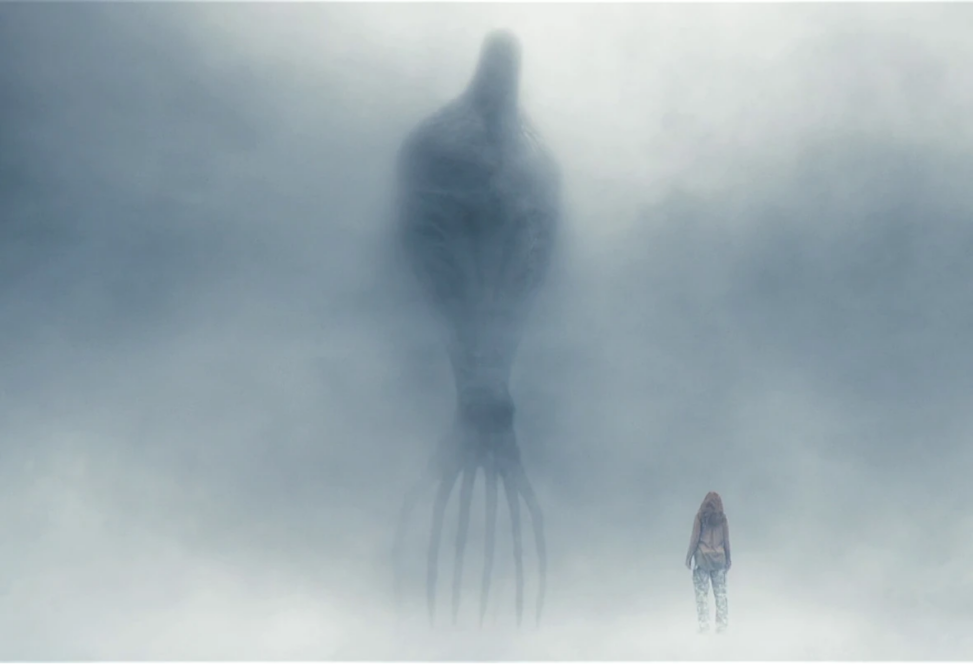Arrival (2016), Directed by Denis Villeneuve, is a science-fiction film about aliens coming to Earth. The plot follows Dr. Louise Banks, a linguistics professor. The US government recruited them to decode an alien language so the government could communicate with them. Twelve alien ships land on Earth, but at this time, they haven’t done anything. During the films, tensions are growing among the major countries, with some planning to attack the ships. Louise then begins to understand the Heptapod language, and it starts to rework her perception of time. Then she learns that the Heptapods are not here to invade but to help. Due to their ability to perceive the future, they know they will eventually need humanity’s help with something, so they help them first. Due to the nature of the Heptapod language, this film challenges the idea of linear storytelling, a staple in Western cinema. Arrival critiques traditional sci-fi stereotypes through its representations of gender, race, and difference.
The film opens with a montage Showing Louise raising her daughter and eventually mouthing her after her death from cancer. This is important as it shows Louise as a mother first; it subverts stereotypical roles of women in sci-fi films as being second-hand to the male protagonist. Later in the film, once Louise understands the Heptapod language, it’s revealed that this opening scene is actually a flash forward. It shows what happens after the film’s events. Putting this at the start of the film changes the preconceptions some might have of a female protagonist; it shows that she has been thrown through hardship and loss. Louise embodies hybridity by balancing personal grief with professional brilliance. From Postcolonial Cinema Studies, Bhabha says, “Postcolonial narratives challenge linear modes of Storytelling and reframing marginalized identities.” In other Sci-Fi films like Gravity, female protagonists are often defined solely by their survival instincts, whereas Louise is intelligent, empathetic and resilient.
Building off of the first scene, the nonlinear reveal emphasizes cooperation beyond individualism. Louise uses the ability to perceive time differently to stop the oncoming conflict with China. There isn’t a big confrontation but a conversation between two people to prevent this. From Critique of Western Science, Harding says, “Wester science marginalizes other ways of knowing.” Louise’s acceptance of the Heptapod language critiques Western linear thinking, aligning with post-colonial ideals. Western-dominated narratives like Independence Day emphasize individual heroism. Arrival uses collaboration to challenge this norm.
The initial flash-forward scene reframes Louis’s understanding of her daughter’s life and death on a larger scale. Louise chooses to spend limited time with her daughter, understanding that it will eventually end. This mirrors the film’s treatment of the Heptapods (Abbot and Castello), whose alien language, biology, and perception of time become a source of strength rather than conflict. Bhabha says that “Hybridity disrupts sites of discrimination and domination.” Louise’s choice to embrace the hands-on experience of her daughter’s life reflects a postcolonial reflection of binary thinking. The circular montage emphasizes the film’s rejection of linear progression, offering a decolonized view of time and identity. Soft lighting and close-ups in the first scene, along with Max Richter’s On The Nature of Daylight playing as the music, contrast with the stark military images later. This highlights the film’s movement from fear to understanding.
Overall, Arrival, through its nonlinear storytelling and subversion of stereotypes, critiques traditional representations of gender, race, and difference, positioning Louise as a bridge between worlds. The first scene in the film encapsulates the themes present. Showing that difference, whether it be linguistic, temporal, or emotional, is not a threat but a source of unity. Arrival challenges viewers to embrace alternative perspectives, decolonizing how we view time, identity, and cooperation. Arrival redefines enlightened representation in Sci-Fi, offering a hopeful vision of connections across differences.

Provide Feedback